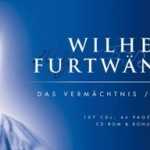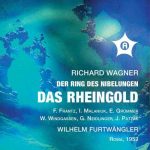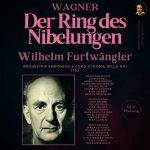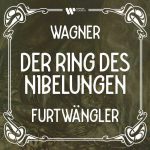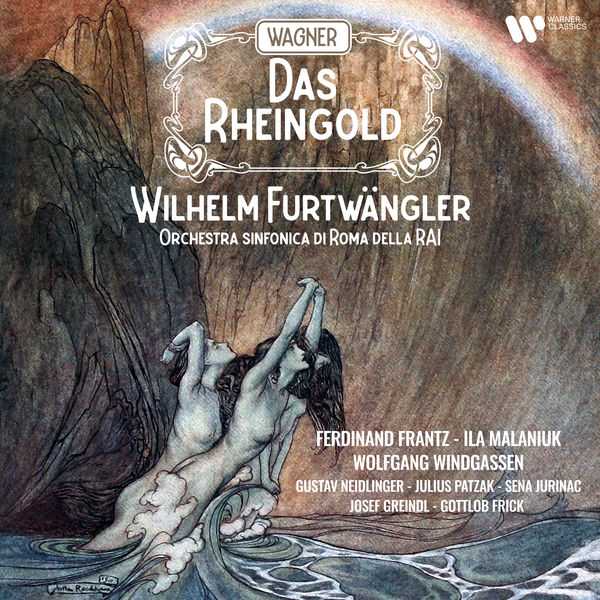
Composer: Richard Wagner
Performer: Ferdinand Frantz, Ira Malaniuk, Wolfgang Windgassen, Gustav Niedlinger, Julius Patzak, Sena Jurinac, Josef Greindl, Gottlob Frick
Orchestra: Orchestra Sinfonica di Roma della RAI
Conductor: Wilhelm Furtwängler
Format: FLAC (tracks)
Label: Warner
Release: 1990
Size: 482 MB
Recovery: +3%
Scan: cover
Das Rheingold
01. Vorspiel
Scene 1
02. “Weia! Waga! Woge, du Welle” (Woglinde, Wellgunde, Floßhilde)
03. “Hehe! Ihr Nicker!” (Alberich, Woglinde, Wellgunde, Floßhilde)
04. “Garstig glatter glitschiger Glimmer!” (Alberich, Woglinde, Wellgunde, Floßhilde)
05. “Lugt, Schwestern!” (Woglinde, Wellgunde, Floßhilde)
06. “Was ist’s, ihr Glatten” (Alberich, Woglinde, Wellgunde, Floßhilde)
07. “Der Welt Erbe” (Alberich, Woglinde, Wellgunde, Floßhilde)
08. “Bangt euch noch nicht?” (Alberich, Woglinde, Floßhilde, Wellgunde)
Scene 2
09. “Wotan! Gemahl! erwache!” (Wotan, Fricka)
10. “Um des Gatten Treue besorgt” (Fricka, Wotan)
11. “So schirme sie jetzt” (Fricka, Freia, Wotan)
12. “Sanft schloß Schlaf dein Aug'” (Fasolt, Wotan, Fafner)
13. “Lichtsohn du, leicht gefügler” (Fasolt, Wotan, Fafner, Freia)
14. “Zu mir, Freia!” (Froh, Donner, Fafner, Fasolt, Freia, Fricka)
15. “Endlich Loge!” (Wotan, Loge, Fricka, Froh, Donner, Fafner, Fasolt)
16. “Immer ist Undank Loges Lohn!” (Loge)
17. “Nur einen sah ‘ich” (Loge, Wotan)
18. “Nicht gönn’ ich das Gold dern Alben” (Fasolt, Fafner, Loge, Wotan, Fricka)
19. “Des Reifes zu walten” (Wotan, Loge, Donner, Froh, Fricka, Fafner)
20. “Hör’, Wotan, der Harrenden Wort!” (Fafner, Wotan, Fasolt, Freia, Froh, Donner)
21. “Über Stock und Stein zu Tal” (Loge, Fricka, Donner, Froh)
22. “Jetzt fand ich’s” (Loge, Fricka)
23. “Auf, Loge, hinab mit mir!” (Wotan, Loge, Donner, Froh, Fricka)
Scene 3
24. “Hehe! Hehe! Hieher! Hieher!” (Alberich, Mime)
25. “Schau, du Schelm!” (Alberich, Mime)
26. “Nibelheim hier” (Loge, Mime, Wotan)
27. “Nehmt euch in acht!” (Mime, Wotan, Alberich)
28. “Was wollt ihr hier?” (Alberich, Wotan, Loge)
29. “Die in linder Lüfte Wehn da oben ihr lebt” (Alberich, Wotan, Loge)
30. “Wen doch faßte nicht Wunder” (Loge, Alberich)
31. “Riesen-Wurm winde sich ringelnd!” (Alberich, Loge, Wotan)
32. “Nun schnell hinauf” (Loge)
Scene 4
33. “Da, Vetter, sitze du fest!” (Loge, Alberich, Wotan)
34. “Wohlan, die Niblungen im rief ich mir nah'” (Alberich, Wotan)
35. “Gesahlt hab’ ich” (Alberich, Loge, Wotan)
36. “Bin ich nun frei?” (Alberich, Loge, Wotan)
37. “Fasolt und Fafner nahen von fern” (Loge, Froh, Donner, Fricka)
38. “Halt! Nicht sie berührt!” (Fasolt, Wotan, Fafner, Froh)
39. “Nicht so leicht und locker gefügt” (Fafner, Loge, Wotan, Fricka, Donner)
40. “Freia, die Schöne” (Fasolt, Loge, Fafner, Wotan, Freia, Fricka, Froh, Donner)
41. “Weiche, Wotan, weiche!” (Erda, Wotan, Fricka)
42. “Hört, ihr Riesen!” (Donner, Freia)
43. “Halt, du Gieriger!” (Fasolt, Fafner, Loge, Wotan)
44. “Was gelicht, Wotan” (Loge, Wotan, Fricka)
45. “Schwüles Gedünst schwebt in der Luft” (Donner)
46. “Zur Burg führt die Brücke” (Froh)
47. “Ihrem Ende eilen sie zu” (Loge)
48. “Rheingold! Rheingold!” (Woglinde, Wellgunde, Floßhilde, Wotan, Loge)
One could argue that the Ring cycle from which this Das Rheingold is taken is the greatest ever recorded. There may, of course, be younger listeners who’d say the honor should go to Solti for its intensity or the Karajan for its clarity or the Levine for its lucidity, and older listeners who’d say it should go to the Krauss for its fire or the Keilberth for its drive or the Knappertsbusch for its flow. But while few would deny the merits of those superlative recordings, the Ring that starts with this Rheingold is arguably greater.
To direct this Ring, Rome Radio hired Wilhelm Furtwängler — by common assent, the greatest twentieth century conductor of the nineteenth century Austro-German repertoire in general and of Wagner in particular. To let the cast rest its voices and gather strength, this Ring was recorded one act at a time every two to four days in autumn 1953. Composed in an uninterrupted act, this Rheingold was taped in a single session on October 26 before a very quiet audience with very precise microphone placements to capture the best possible sound for later broadcast. The cast Furtwängler chose was the best of its time, with the forceful Wotan of Ferdinand Frantz, the sympathetic Alberich of Gustav Neidlinger, the imposing Fricka of Ira Malaniuk, the frightening Ruth Siewert as Erda, the comely Freia of Elisabeth Grümmer, and, in a casting coup, the fiery young tenor Wolfgang Windgassen as Loge.
Beyond the excellence of the cast, what makes this a great Rheingold is what makes this a great Ring: a first-class orchestra inspired by the excitement of performing the music for the first time led by a conductor whose uncanny ability to communicate the music’s luminous magnificence was unequaled. Furtwängler’s control of the score’s myriad details was complete and his grasp of its relentless drama was unyieldingly legendary, and he is able to bend tempos and shape forms with improvisatory genius on his way to the final gargantuan climax. Rising from the depths of the Rhine to the heights of Valhalla in one single, unbroken arch, Furtwängler, his German soloists, and his Italian orchestra have created a mighty prelude to the Ring that’s stunning on its own and staggering in its implications. Though the 1953 live radio monaural sound is antique, the quality of the performance is nevertheless sublime. Anyone who loves Wagner should hear this performance.
